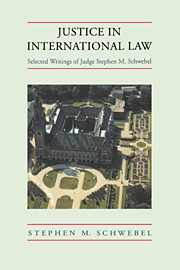Book contents
- Frontmatter
- Contents
- Preface
- PART I International Court of Justice
- 1 Reflections on the Role of the International Court of Justice
- 2 Relations Between the International Court of Justice and the United Nations
- 3 Was the Capacity to Request an Advisory Opinion Wider in the Permanent Court of International Justice than it is in the International Court of Justice?
- 4 Authorizing the Secretary-General of the United Nations to Request Advisory Opinions of the International Court of Justice
- 5 Preliminary Rulings by the International Court of Justice at the Instance of National Courts
- 6 Chambers of the International Court of Justice Formed for Particular Cases
- 7 Three Cases of Fact-Finding by the International Court of Justice
- 8 Indirect Aggression in the International Court
- 9 Human Rights in the World Court
- PART II International Arbitration
- PART III United Nations
- PART IV International Contracts and Expropriation
- PART V Aggression under, Compliance with, and Development of International Law
- List of publications
- Index
7 - Three Cases of Fact-Finding by the International Court of Justice
Published online by Cambridge University Press: 06 November 2009
- Frontmatter
- Contents
- Preface
- PART I International Court of Justice
- 1 Reflections on the Role of the International Court of Justice
- 2 Relations Between the International Court of Justice and the United Nations
- 3 Was the Capacity to Request an Advisory Opinion Wider in the Permanent Court of International Justice than it is in the International Court of Justice?
- 4 Authorizing the Secretary-General of the United Nations to Request Advisory Opinions of the International Court of Justice
- 5 Preliminary Rulings by the International Court of Justice at the Instance of National Courts
- 6 Chambers of the International Court of Justice Formed for Particular Cases
- 7 Three Cases of Fact-Finding by the International Court of Justice
- 8 Indirect Aggression in the International Court
- 9 Human Rights in the World Court
- PART II International Arbitration
- PART III United Nations
- PART IV International Contracts and Expropriation
- PART V Aggression under, Compliance with, and Development of International Law
- List of publications
- Index
Summary
The editor of this volume, Professor Richard B. Lillich, has written a Preface to it which he is particularly qualified to write, as the chairman of the Sokol Colloquia at the University of Virginia, the editor of the distinguished Procedural Aspects of International Law Series, and a leading scholar and practitioner in the field of international litigation. He has invited me to prepare an Introduction, containing such observations on the topic and papers of this volume as I may have been stimulated to make by them and by my participation in the Eleventh Sokol Colloquium. While I found all of the papers stimulating, I shall confine these comments to aspects of fact-finding in the International Court of Justice. In taking up Professor Lillich's invitation, I have been guided by the forthright Foreword written by Judge Philip C. Jessup to Volume 13 of the Procedural Aspects of International Law Series, the revised edition of D. Sandifer's Evidence before International Tribunals (1975). My concerns may be illustrated by the Court's fact-finding in three cases in which I have participated: the ELSI case, the Yakimetz case, and the Nicaragua case. In my discussion of these cases, I am constrained to say no more than I have already set out in my dissenting opinions.
Case Concerning Elettronica Sicula S.P.A. (ELSI) – and Chamber Advantages
The ELSI case turned on allegations by the United States that the requisition by Italian authorities of a factory in Sicily operated by an Italian company whose stock was wholly owned by two American companies was in breach of provisions of a 1948 Treaty of Friendship, Commerce, and Navigation between the United States and Italy.
- Type
- Chapter
- Information
- Justice in International LawSelected Writings, pp. 125 - 139Publisher: Cambridge University PressPrint publication year: 1994
- 1
- Cited by



